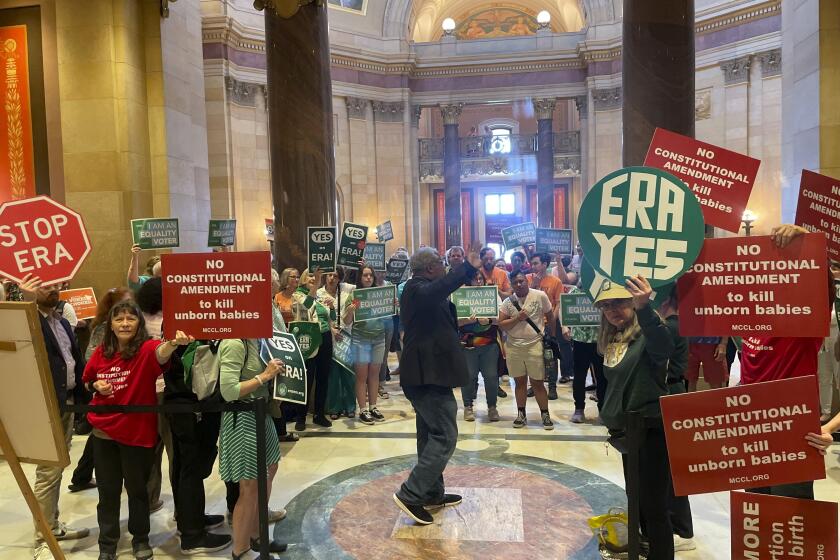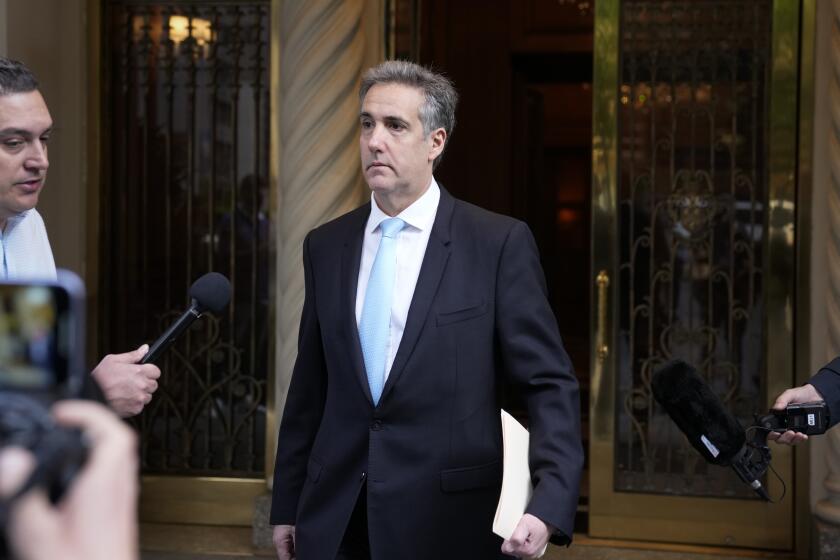House OKs Faster Federal Court Accesss for Landowners
Setting the stage for a veto confrontation with President Clinton, the House on Wednesday approved a bill to grant developers and property owners speedy access to the federal courts in challenging local zoning and environmental restrictions.
“This bill is about equal access to justice,” declared Rep. Elton Gallegly (R-Simi Valley), sponsor of the property-rights measure.
The National Assn. of Home Builders also hailed the bill’s passage. Kent Colton, the group’s executive vice president, said that it would put an end to the “endless maze” of “administrative remedies” that property owners must navigate before a federal court grants them a hearing.
But the Clinton administration and environmentalists said that the bill would produce a “radical” tilt in the balance of power in land-use controversies--in favor of property owners and developers and at the expense of communities and those living near the parcels in question.
White House officials said that Atty. Gen. Janet Reno, Interior Secretary Bruce Babbitt and Environmental Protection Agency Administrator Carol Browner, among others, will recommend a presidential veto because the bill would “improperly and seriously interfere with needed property-rights protections at all levels of government, especially local protections for neighborhoods and communities.”
The House passed such a bill last year, but the Senate never took up the legislation. This year, 19 senators are co-sponsoring a bill identical to Gallegly’s, but its chances of passage are unclear.
During debate on the bill, Rep. Melvin L. Watt (D-N.C.) predicted that it would cripple an already over-burdened federal court system. Rep. Sam Farr (D-Carmel) derided the legislation as “a fast track for developers” that seeks to bypass the local zoning process.
And some of the measure’s critics accused congressional Republicans of being inconsistent by voting to enlarge the federal presence in local and state affairs while on most issues preaching devolution of decision-making away from Washington.
Gallegly contended that the measure would simply provide developers and property owners “their day in court” without having to “wait years and years” for disputes to be resolved administratively.
The final vote on the bill was 248 to 178, with 55 Democrats joining 193 Republicans to pass the measure, the dense, legalistic content of which belied the emotional nature of the controversy.
While the 5th Amendment of the Constitution allows the government--with just compensation--to take private property, less clear is a property owner’s recourse in challenging such a “taking.”
Currently, such disputes typically are handled by local administrative bodies and state courts. But that process can take years--leaving the property and its owner in limbo--because the owner must exhaust all local and state remedies before turning to a federal court for relief.
According to Gallegly, as many as 80% of such land-use disputes brought to the federal courts are “kicked back” to state and local jurisdictions, largely because the case is considered not “ripe” for federal intervention.
Federal courts also often abstain from such cases because they are reluctant to adjudicate sensitive state regulatory or political issues. And control over land-use typically has been seen as a quintessential local issue.
Gallegly’s Private Property Rights Implementation Act would redefine two key legal doctrines in the federal Rules of Civil Procedure and allow federal courts to step in--and much earlier--in such a dispute.
It does so by spelling out when a land-use dispute has “ripened” and by prohibiting federal judges from invoking the “abstention doctrine” to avoid cases that involved 5th Amendment “takings.”
For instance, the bill would allow landowners to go straight to federal court after an appeal to a local governing body has been denied.
Since compensation for a “taking” is spelled out in the 5th Amendment, Gallegly and other proponents argued, it is only sensible for the matter to be handled--expeditiously--in the federal courts.
“The real problem [in land-use disputes] is delay,” said Rep. Henry J. Hyde (R-Ill.), chairman of the House Judiciary Committee and a strong backer of the measure.
But a GOP critic of the measure, Rep. Wayne T. Gilchrest (R-Md.), contended that the bill “deals with local zoning laws that have nothing to do with the federal government.”
Gilchrest was one of 30 Republicans to vote against the bill.
Other opponents said that the measure would dramatically shift the authority to decide local land-use disputes from states and localities to the federal courts. Critics also said that the bill--by allowing developers to sue local officials without adequately seeking to resolve their disputes outside the courthouse--would undermine the authority of states and localities to negotiate with developers and property owners.
“I think this is insane,” fumed Rep. John D. Dingell (D-Mich.).
Foes include the attorneys general of more than 40 states and territories, as well as the National Conference of State Legislatures, the U.S. Judicial Conference, the U.S. Conference of Mayors and the National League of Cities.
But Gallegly, a former mayor of Simi Valley, said that “every mayor” in his district with whom he has spoken backs his bill.
More to Read
Get the L.A. Times Politics newsletter
Deeply reported insights into legislation, politics and policy from Sacramento, Washington and beyond. In your inbox three times per week.
You may occasionally receive promotional content from the Los Angeles Times.






